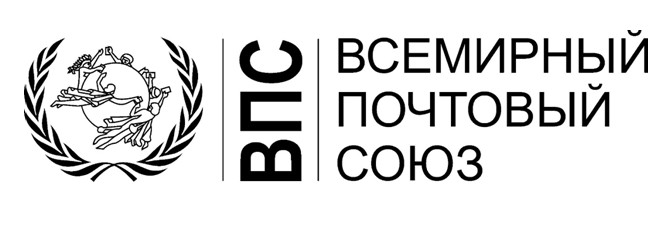
The UPU event “Day of Remote Instruction for the Europe and CIS Region” was held on July 23, 2021 via video conferencing using the Zoom platform.
The event was attended by more than 150 representatives of Communications Administrations and postal operators from the CIS and Eastern Europe, including the Republic of Azerbaijan, the Republic of Armenia, the Republic of Belarus, the Republic of Kazakhstan, the Kyrgyz Republic, Mongolia, the Russian Federation, the Republic of Tajikistan, Turkmenistan, the Republic Uzbekistan, the Republic of Bulgaria, the Republic of Latvia, the Republic of Lithuania, the Republic of Slovenia, as well as the RCC Executive Committee.
The meeting was opened and the moderator of this event, Andrey Sudakov, addressed the meeting with a welcoming speech, thanking the communications administration, the designated operators and regional unions for their active response.
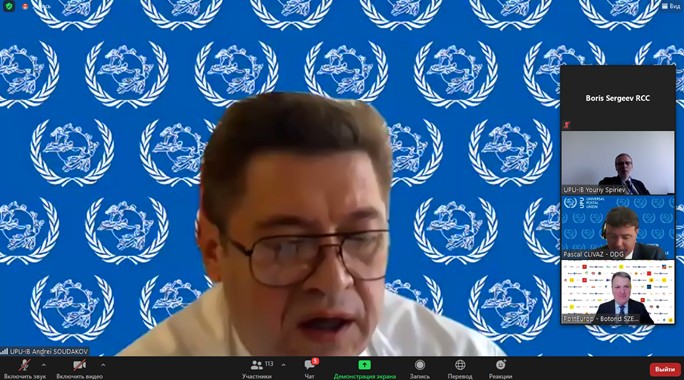
The agenda included organizational issues of the 27th UPU Congress and strategic topics that will be discussed at it.
The moderator also noted that the countries were provided with an analytical note, in which the main problematic points related to the holding of the Congress were recorded.
The General Director of the International Bureau of the Universal Postal Union Bishar Abdirahman Hussein greeted the participants, stressing that the pandemic had brought about significant changes in the life of the whole society and, of course, the postal service. Governments have become convinced of the importance of the post for the functioning of the economy.
To strengthen mutual understanding between the postal services, the main issues of concern will be brought up for discussion at the 27th UPU Congress.
Ahead of it, the UPU International Bureau prepared a survey that assesses how far the postal community has progressed in addressing them.
The pandemic seriously affected the functioning of the UPU bodies, in 2020 there were actively expressed demands for an Extraordinary UPU Congress, at which only the most urgent issues would be considered.
As a result, it was decided to hold the Congress in 2021 in Côte d'Ivoire with the assumption of hybrid participation. Everything is now ready for the Congress, and it is in Côte d'Ivoire, and not in Geneva.
However, some states stated that they did not trust the electronic voting system and offered to hold a parallel face-to-face voting in Geneva for those who would not be able to arrive in Côte d'Ivoire. At the Pan African Postal Union (PAPU) conference in June 2021, African countries said they object to the postponement of Congress events from Abidjan. A split line has emerged in the UPU. Member States should take an informed decision on this matter.
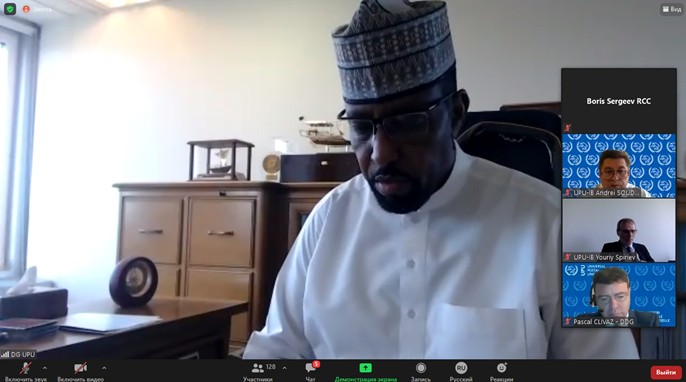
Then the floor was given to Pascal Cleave, Deputy Director General of the UPU IB, who also stressed that everything was ready for the Congress. The possibility of remote participation has been prepared.
This meeting is attended by UPU officials who are ready to answer any questions.
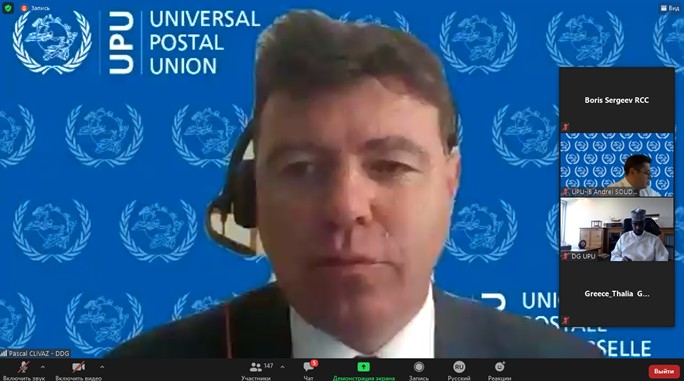
The organization of the 27th Congress was highlighted by the representative of the International Bureau Siva Somasundram.
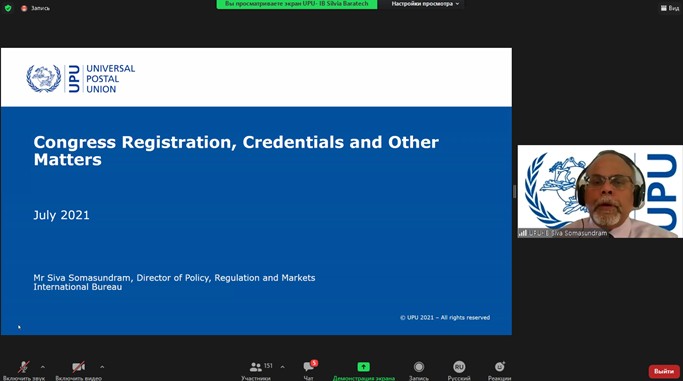
He outlined three options for holding the Congress. In the first case, the Congress is held in person, in accordance with the current UPU documents.
In the second option, the 27th Congress is proposed on a hybrid basis using an electronic voting platform. In a hybrid format, the first day of meetings will be in-person only, and during it delegates must decide on the transition to a hybrid format.
The third option is “hybrid +” - the Congress will be held in a hybrid format, but on issues requiring a secret ballot (elections and issues on which member states have requested a face-to-face vote), voting will be held in Abidjan and Geneva.
He also noted the importance of timely registration, confirmation of credentials and accreditation of delegates. Although the number of delegates from a country is not limited, during the plenary sessions, there will be no more than 2 representatives per country. If the country in Abidjan is represented by diplomats working in Africa, then they should also be given the appropriate powers. When organizing a vote in Geneva, the credentials of the countries voting there must be confirmed.
The rules of procedure are planned to be changed: from the second day of the Congress, a country that has not submitted accreditation documents will not be able to take part in the voting.
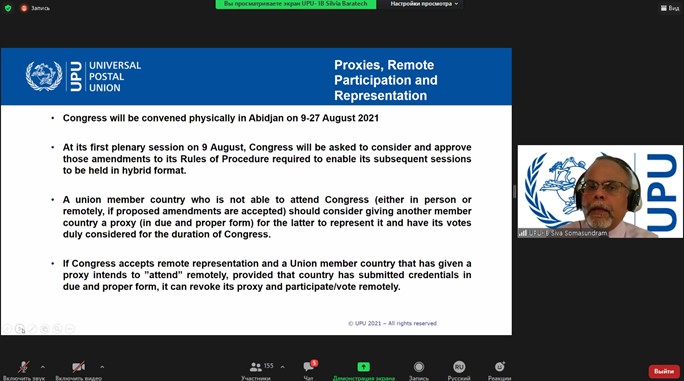
Countries that do not have the opportunity to physically participate in the Congress can entrust the representation of their interests to another country, in which case the powers of the trustee must be duly formalized. The trustee represents the interests of a country that has no opportunity to participate in the Congress. If it is impossible to participate in a specific meeting, the country can appoint a representative from among other UPU member states participating in the event, also formalizing the powers of the latter and notifying the chairman of the meeting.
Ricardo Guillerme (UPU Legal Counsel) also noted the importance of accreditation for all members of the delegation. The relevant documents can also be provided in electronic format.
Lati Matata (UPU Postal Technology Center) spoke about the UPU virtual conferencing system, which includes video conferencing, two-way and multilateral communication, and voting.
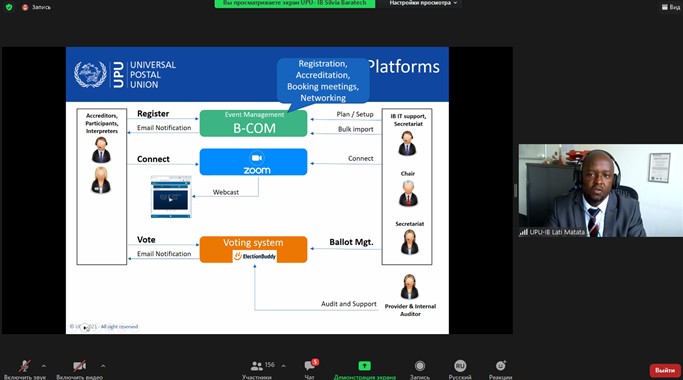
There is a possibility of simultaneous translation. There will also be an opportunity to conduct electronic voting. Only delegates authorized to vote will receive the secret code. In the event that several delegates from a country vote, only the first vote will be taken into account. The secret code is valid only for the period of a particular voting. After the completion of the voting, an audit will be carried out, according to the results of which it is possible to check whether the vote cast on behalf of the country has been taken into account. The system guarantees the anonymity of the voting. It is imperative to register on the electronic platform in a timely manner. The UPU International Bureau has prepared guidelines on these issues.
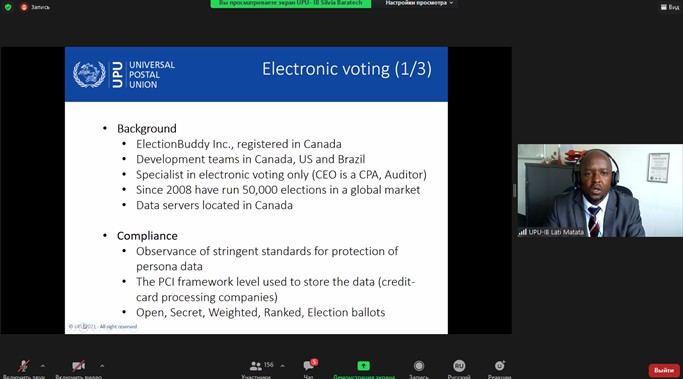
Then the meeting continued in the format of questions and answers.
Boton Scebeni (PostEurop) spoke about the preparation of his organization for the 27th UPU Congress.
Emil Akhmadov (Azerbaijan) discussed the issue of accrediting representatives of this country at the Congress. Representatives of the UPU IB stressed that documents confirming the credentials of delegates must arrive in Bern before August 4, 2021.
Maria Lyalina (Ministry of Digital Industry of Russia) asked to clarify when the system of accreditation of delegates will work, as well as by what electronic means can be used to confirm the credentials of delegates. The UPU IB Legal Counsel replied that the authorization could be confirmed by a scanned document sent as an attachment to an e-mail. Electronic confirmation allows you to change the composition of the delegation during the Congress.
Lati Matata noted that the accreditation system will open in the near future.
During the responses, representatives of the UPU IB explained that delegates will have the opportunity to contact technical support if there are problems with the electronic voting system. At the same time, delegations should pre-allocate voting power on specific issues and take into account that once a vote has been cast, it will not be possible to change it.
Olga Zakharova (Russian Post JSC) asked to clarify whether delegates participating in the work of the Congress remotely, but not having accreditation, will be able to take part in the voting. The answer of the UPU IB legal adviser was that the delegates participate in the work of the Congress only within the framework of the powers determined by the government of the country.
After that, strategic issues submitted to the 27th UPU Congress were considered.
Ricardo Guillerme (Legal Counsel of the UPU IB) called for support of the UPU legislative reform proposals.
Vladislav Dubenko (MB UPU) discussed the system of contributions to the UPU, as well as the system of contributions to the Pension Fund of the UPU. Regarding the UPU system of contributions, he noted that it is very unstable, as member states can revise their contribution every 4 years. A number of countries do not pay fees at all. In this regard, a Task Force on the Review of the Contributions System was established, considered several alternatives and opted for a modified UN scale.
At the same time, debtor countries are proposed to deprive the right of voting in the UPU bodies.
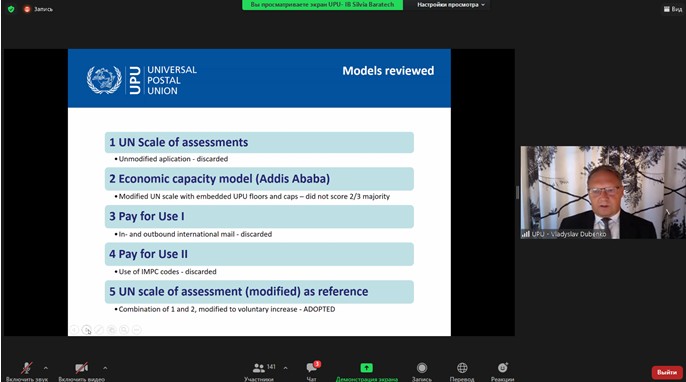
Mutua Mutusi (MB UPU) provided an overview of the work of the task force to open the UPU to a wider audience. It is not only designated operators that operate in the postal sector, and the role of private entities has become particularly visible during the pandemic.
There was an agreement in principle that the UPU needed to open up to new players in order to ensure the integrity of the mail coverage. The Task Force recommends a phased reopening of the UPU, with the possibility of an Extraordinary Congress on this topic in 2023.
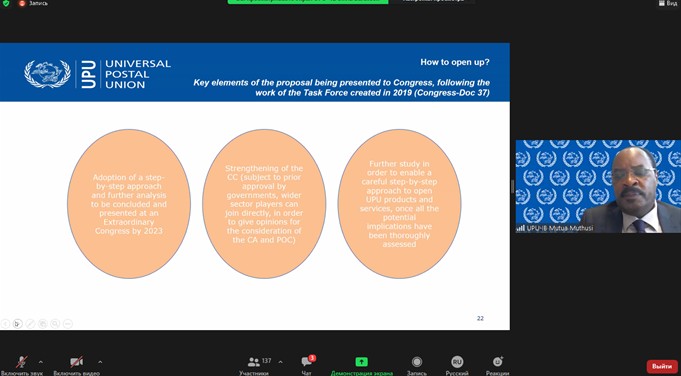
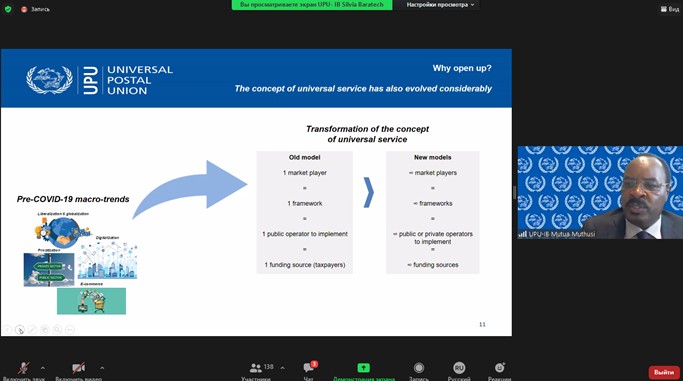
Continuing this topic, Bishar Hussein drew attention to the fact that about 70% of the parcel and express delivery market is in private hands. This happened because at one time the governments of the countries, not the UPU, decided to open the postal sector to private players. As a result, designated operators lose their positions. He accused the Task Force of delaying the decision to open the postal sector and warned that private players could create their own network by gaining control over postal services in Latin America and Africa. In this case, the role of the UPU will be significantly reduced.
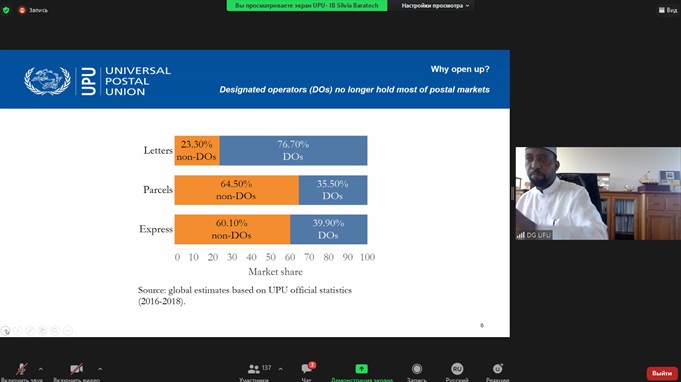
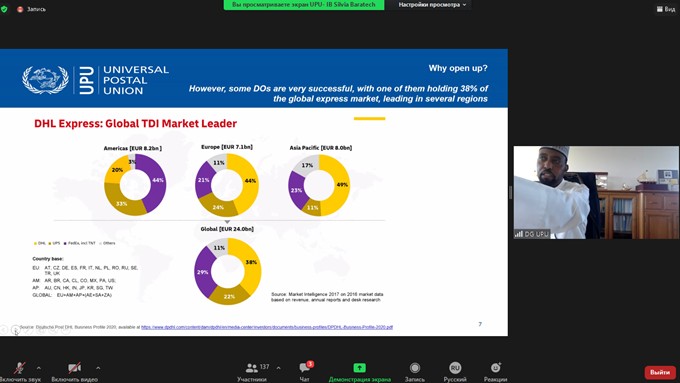
Wendy Eitan (UPU MB) presented the Product Integration Plan 2022-2025.
Paul Schoorl (MB UPU) presented an overview of the integrated payment system.
Mauro Boffa (UPU MB) presented the Abidjan Postal Strategy and Business Plan. He drew attention to the fact that in a pandemic, the demand for postal services is changing significantly and operators have to work in a highly competitive environment, since the role of parcels has grown, where the positions of the private sector are strong.
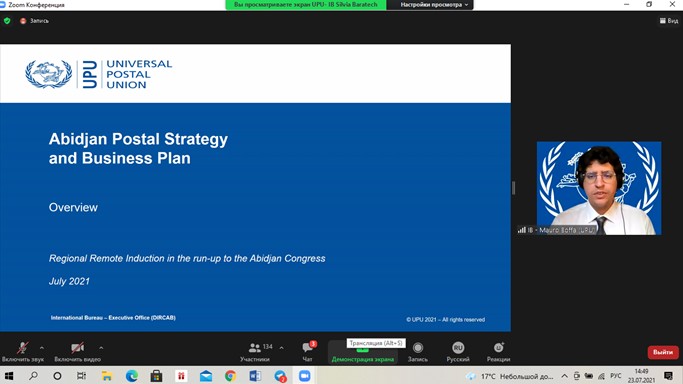
International postal traffic has declined. In light of this, the postal sector is encouraged to focus on technological development and governments to help improve infrastructure.
Gaurav Meta (MB UPU) presented proposals for improving the provision and operation of the Quality Improvement Fund (QADF), noting the significant support that the Fund provides to projects in the CIS and Eastern Europe.
At the end of the meeting, UPU Director General Bishar Hussain said goodbye to the participants, stressing that he always tried to be honest with them and to state the position in accordance with the facts.
The moderator of the meeting, Andrey Sudakov, thanked everyone for their participation and expressed hope for a quick meeting in Abidjan.















